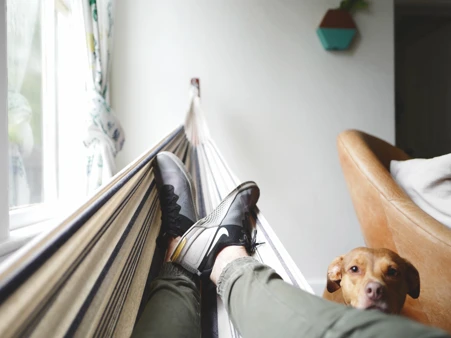In this article:
Will I have to share a house with other people?
How does a shared ownership mortgage work?
How much will Shared Ownership cost me?
Who can apply for Shared Ownership?
Am I restricted to the type of house I can buy?
Is there anything else I need to know about shared ownership?
Frequently asked questions
Related articles
What is Shared Ownership?
Shared Ownership is where you buy a share of a house and you rent the remaining share. Because you’re buying a smaller percentage of the house, this means you can take out a smaller mortgage, and therefore put down a smaller deposit, which makes homeownership more achievable.
If you’re currently renting and you’re worried about your long-term security, Shared Ownership can give you that security as you become a part-owner.
Once you own your shares, you can buy more through a method called 'staircasing,' which means you'll own a bigger share of the property and pay less rent.
Will I have to share a house with other people?
No, you will not have to share a house with anyone else. While it is called Shared Ownership, this is because you share the ownership of the house with the housing association, not other people.
How does a Shared Ownership mortgage work?
You can buy a 25% to 75% share of a house or flat, depending on what your mortgage lender says you can afford based on the property value.
- You only need a mortgage for the share you are buying
- You pay the mortgage on your share and you pay rent on the rest to the housing association
- Because you only need a mortgage to cover your share of the house, your deposit could be a lot lower than if you were buying a whole house outright
If you were to buy a £230,000 house outright, you'd need at least £11,500 to get to 5%. Let's look at some example to see what different shares mean for your deposit:
1. Buying a 50% share with a 5% deposit equates to £5,750. You'd need a minimum income of £27,600. You then pay rent on the other 50% to the housing association.
2. If you have a 25% share with a 5% deposit, you'd need £2,875 and a minimum income of £21,600. You then pay rent on the other 75% share to the housing association*.
You’ll receive a lease that sets out everything, including the amount of the share you’ve bought, how long you can keep the house for (usually 125 years), how much your monthly rental payments are, as well as your responsibilities while living there. Take the time to thoroughly read the lease and ask your solicitor if you have any questions or concerns.
Start your journey today
How much will Shared Ownership cost me?
You’ll have to pay a 5% deposit based on the share you’ve bought, stamp duty on the value of your share, and any legal fees to your solicitor. These exact amounts will depend on the purchase price of the house and the amount of deposit/rent you pay.
Who can apply for Shared Ownership?
Many people think it’s just for first time buyers, but this isn’t necessarily the case. Shared Ownership will work for anyone who fits the following criteria:
- Be able to put down a deposit of 5-10%
- Must not already own another property
- Have a total household income of £80,000 or less (under £90,000 in London)
- You need a good credit history and prove you can afford the costs (as you would when buying any other house)
Am I restricted to the type of house I can buy?
Shared ownership schemes are usually available on either new build houses or resales from current shared ownership home owners. The housing association will be able to show you their property listings.
What is ‘staircasing?’
Staircasing is the process of increasing your share of the house. You can keep increasing your amount until you own the property outright. Some housing associations may cap the amount of shares you can buy, so make sure you check this out first if outright homeownership is your goal.
With every increase of your share, the amount of rent you pay will be recalculated and reduced accordingly.
Please note - you are under no obligation to increase your sharehold. It can remain as it was the day you first started the scheme.
Is there anything else I need to know about Shared Ownership?
- You can decorate, hang pictures , and put up shelves as you'd like to make the place your own. However, you’ll have to run any bigger renovation plans past the housing association first
- If you have a pet, or would like one, make sure you read your lease. If you’re buying a house, this is usually fine, but the rules are sometimes different for a flat or an apartment
- You can sell your share at any time to another Shared Ownership buyer through the housing association, or by yourself if you own 100% of the house.
Do your research
Different rules often apply when looking at Shared Ownership properties in certain rural areas, so please bear this in mind when viewing houses and you check this with the housing association.
Visit the Shared Ownership website for more information, or if you’d like to speak to one of our mortgage advisers, get in touch and we'll be happy to help.
Are you just starting out? Check out our 'First time buyers' page for more information about buying your first home.
* Research by Savills.
Important information
Your home may be repossessed if you do not keep up repayments on your mortgage.
There may be a fee for mortgage advice. The actual amount you pay will depend on your circumstances. The fee is up to 1% but a typical fee is 0.3% of the amount borrowed.

